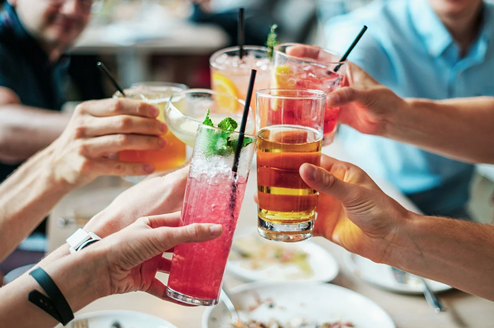BY GEMMA CROTTY
Post-cancer life should certainly be full of celebration, and for some, this might include enjoying the occasional drink. But before rushing into previous habits, survivors should reconsider the way that they consume alcohol.
A healthy mind and body is optimal for recovery after cancer, and the last thing survivors want is further health issues. That is why it is so important for survivors to understand how their favourite alcoholic beverages may affect them.
Impact on health
The National Institute on Alcohol Abuse and Alcoholism describes what alcohol may do to one’s health, including:
- Affecting the way that the brain functions, such as the ability to think clearly, and interfering with behaviour and mood
- Damage of the liver, which could lead to a variety of liver problems in the long term
- Putting strain on the heart- which may cause high blood pressure, stroke, an irregular heartbeat, or stretching and drooping of the heart muscle.
- The production of toxic substances by the pancreas, leading to pancreatitis- ‘a dangerous inflammation and swelling of the blood vessels in the pancreas that prevents proper digestion.’
- Attacking one’s immune system, making the person more vulnerable to disease
Additionally, another unwanted side effect may be weight gain. Alcohol contains more calories than many people realise, and so drinking regularly may put on the kilos. Further, the Cancer Council NSW reveals alcohol can also prompt overeating, with this paving the way for obesity. Evidently, this is something survivors should be wary of when trying to live healthy lives after cancer.
Cancer and cancer recurrence
Long-term alcohol use has been shown to increase the risk of certain cancers, as revealed by the American Cancer Society (ACS). For example, breast cancer is particularly prominent among alcohol drinkers as it increases estrogen levels. Other cancers include those of the liver, colon, rectum, mouth, throat and oesophagus.
According to the ACS, when it comes to cancer recurrence, there is a lack of evidence to prove that alcohol causes the same cancer to return. However, regardless, it is more advantageous for survivors to carefully consider the risks and do what they can to prevent recurrence or a secondary cancer diagnosis.
How much is okay to drink?
The best advice for survivors is to drink in moderation, with the ACS recommending no more than one standard drink a day for women and no more than two drinks for men.
A “standard drink” is considered to be:
- Wine- 100 mL
- Full strength beer- 285 mL (middy)
- Light beer – 450 mL (schooner)
- Alcoholic soda- 220–250 mL
- Spirits- 30 mL
To cut back on your alcohol intake, some methods include:
- Alternating with non-alcoholic beverages
- Waiting until your glass is empty before topping up, to keep track of how many drinks you’ve had
- Being the designated driver if going out
- Making non-alcoholic recipes to take to a function
- Informing family and friends that you’ve cut down, so they don’t pressure or tempt you
There have been reports of surprisingly high alcohol intakes by former cancer patients, with a study revealing that 34.9% of cancer survivors who were alcohol drinkers were prone to exceeding moderate drinking levels.
For the benefit of their mental and physical welfare, it is important for survivors to seek help if they are struggling with binge drinking or alcohol addiction.
Gemma Crotty is a volunteer blog writer for Solaris Cancer Centre from her home in Melbourne. Currently studying a Graduate Diploma in Communication at La Trobe University, she is considering a career in communications or journalism. Gemma has a strong humanities research background from her Bachelor of Liberal Arts in Sydney. She has a keen passion for writing and likes to find new ways to hone her skills and connect to others through her words.





